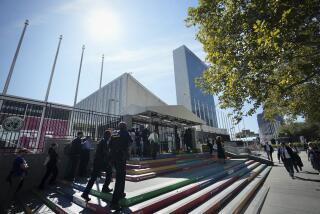Here He Comes, Ready to Deal : As Target of Gorbachev Visit, Bush Must Set His Own Path
- Share via
With characteristic flair, Mikhail Gorbachev is taking advantage of the U.N. General Assembly to arrange a final farewell in New York with Ronald Reagan, his American partner in “new thinking.” But his real target is George Bush.
Gorbachev’s get-together Wednesday may not be altogether a surprise attack, but it is something of a diplomatic coup. Presidents-elect don’t usually begin receiving foreign visitors before they are inaugurated. On the other hand, Bush is the sitting vice president who first met Gorbachev when he flew to Moscow in March, 1985, for Konstantin U. Chernenko’s funeral.
Not surprisingly, U.S. officials are already minimizing the significance of the coming encounter. That doesn’t mean it won’t be important.
Gorbachev will be using charm and persuasion to commit Bush to the process in Soviet-American relations that has been set in motion by Reagan. If possible, the Soviet leader would like to move Bush closer to the Gorbachev agenda.
Specifically, Gorbachev is likely to press the following:
--Priority for negotiations on major reductions in long-range, nuclear-tipped missiles and de-emphasis on space-based defense systems like “Star Wars.”
--Help from the United States to arrange a “decent interval” in Afghanistan during which Moscow can safely withdraw the remainder of its troops.
--Greater commerce and credits between the Soviet Union and the United States and increased cooperation in scientific exchanges.
--Recognition from the United States that the Soviet Union has made important strides in human rights and deserves to host a human-rights conference in Moscow.
What should the American posture be on these issues? Even before Inauguration Day, Bush will feel the pressures Gorbachev has been generating with his image as a dynamic new leader willing and eager to cut deals.
First, the President-elect must judge the usefulness of proceeding directly in Reagan’s footsteps to large reductions in our key deterrent. Does it make sense to commit the nation to dismantling strategic missiles before the Soviet Union has provided a solid track record of compliance with the treaty to destroy intermediate-range missiles in Europe? Would it not make more sense to seek a breakthrough in reductions of conventional forces in Europe?
Second, the United States should view with sympathy, but also caution, Gorbachev’s efforts to revitalize the Soviet economy. The Soviet consumer scene is an unbelievable mess. Seventy years after the Russian Revolution, the world’s largest and potentially richest country still cannot feed its people and its livestock without huge grain imports. Many provincial towns are on food rationing. The shortage of ordinary goods and services is legendary. The United States could be helpful--without contributing toward military strength--in selling agricultural know-how, training programs and specific services as well as products like grain.
Third, the United States has good reason to expand some types of scientific cooperation with the Soviet Union. While Soviet spokesmen openly complain these days that their superpower is losing its scientific edge in many areas, the Soviet Union still possesses many fine scientific minds. The United States ought to be aware of what these scientists are doing, especially in space exploration, atomic physics, nuclear energy and medical research. One major problem arises in technology: Incredible delays in turning bright ideas into usable applications creates a major incentive for Moscow to conduct technological espionage abroad even as it seeks better political relations. Any joint U.S.-Soviet project to reconnoiter Mars must carry adequate safeguards against technological skimming.
Finally, human rights and Afghanistan. Can the United States endorse a Moscow-sponsored human-rights conference when the whole Soviet political system remains fundamentally geared to protect the state against the individual, rather than the other way around? When militant atheism continues to be a guiding principle of the Soviet state? When Moscow continues to provide military aid to the unpopular communist government in Kabul, threatens dire retaliation against the Afghan resistance and has stalled the withdrawal of its troops?
Gorbachev may be the most interesting and hopeful Soviet leader to appear on the world scene since the Russian Revolution, but one man cannot erase in one day the ingrained suspicions that have grown up between East and West over seven decades. Although he is ready to bargain, Gorbachev is no pushover. The Soviet Union isn’t going to neglect its national interest, or to disarm unilaterally, or to call off its extensive spying abroad. This Dec. 7 will be a day to listen and a day to remember. The trick will be to find a flexible posture that protects our interests while producing balanced, mutually advantageous, agreements that enhance stability and predictability between the two superpowers.
More to Read
Sign up for Essential California
The most important California stories and recommendations in your inbox every morning.
You may occasionally receive promotional content from the Los Angeles Times.













